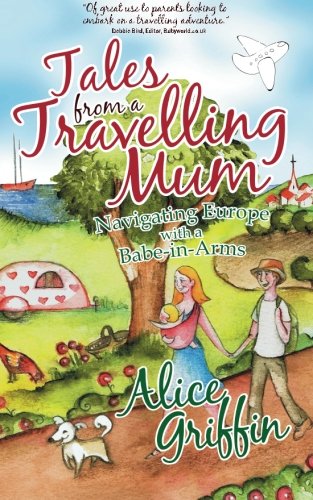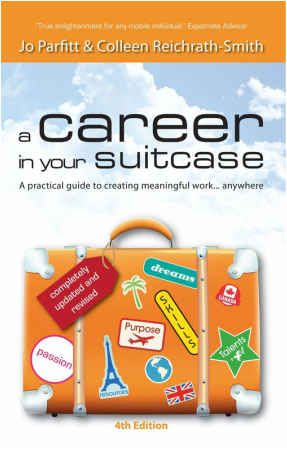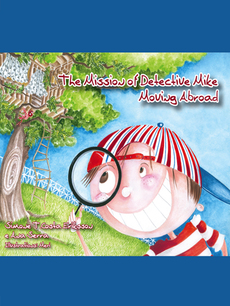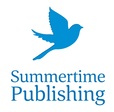 Tell me about your book. What is it about? Can you describe it in just a few sentences? To show that a book has focus it is vital that it can be described briefly and succinctly. Tales from a Travelling Mum is a travel memoir charting family travels during the first two years of my daughter’s life. I write about short vacation trips to Norway and Greece, offering some simple advice along the way, and talk about giving up life in the UK and embarking on a long-term road trip through Europe – family dog included! I guess this book is for armchair travellers, those dreaming of taking a leap into the unknown, and any new parents needing reassurance that travel with our children is still possible, and fun. Why did you write it? Because I have a passion for travel and writing and I enjoy sharing my observations and experiences with interested readers. I also believe that many people think travel with children is difficult, stressful and un-enjoyable and I hoped to prove that actually, by being relaxed and adaptable, this is not the case. Why do you think your book needed to be written? What will your book do for other people?I believe that travel writing has the ability to transport us from our everyday lives and allow us to experience something new, exciting and enjoyable. In my opinion, there can never be too many travel books to be devoured; I am endlessly interested and amazed by people’s travelling tales and observations. My hope is that my book will give readers a similar experience, transporting them to Greece, Norway, France and Spain. Of course, in particular, I hope that it will give other families dreaming of both short and long-term travel, a little inspiration to help them on their own adventures. Who do you think will read your book? What made you think that there was a market for it? If your book has been out for a while, what proof do you have that you were right? There are many top tips and guidebooks for those looking to travel with children, but mine is a personal story and I believed that there would be those in a similar position to myself who would be interested in reading it. It hasn’t been a best seller, but I have been fortunate enough to receive wonderful feedback from a number of readers. Many are of course new parents, but equally there are those who have not been parents of toddlers for some time but enjoy travel writing and enjoyed reading my book, minus the tips. It does not matter how good a book is, or how good your writing is if no one knows about it. What steps have you taken or do you plan to take to promote your book? Are you a speaker or trainer? Do you have a blog? A website? A newsletter? Do you use Facebook, Twitter or other social media tools? What about press releases and sending out review copies and free articles? Have you had any other ideas? Which methods do you think work best and can you give me any examples? When the book was first released I blogged and networked about it relentlessly, as did those mums who contributed: Facebook, Twitter, interviews, articles, blogging networks etc. More than a year since release this has slowed somewhat, but I do still mention it in my bio whenever and wherever possible. I think social networking is the best approach as I have connected with many interested readers in this way. How did you publish your book? Did you find an agent, a publisher or did you publish it yourself? Please describe your process and tell us how you found the experience. I was lucky enough to find Debbie Jenkins (Bookshaker) who reviewed my freelance writing portfolio and suggested the idea of a ‘top tips for travel with children’ book… I explained that this was not really what I to write so after some discussion we settled on the combination of narrative travel writing, plus a little advice. I found the experience was not as daunting as I had previously thought, in huge part of course to Debbie’s interest and belief in me. Self-belief can be a big problem for writers. How did you manage to stay confident in your ability and remember that you were good enough to write your book? How did you cope with the days when you thought you could not do it and that it was rubbish? I think self-belief can certainly be a big problem for most writers! For me, at the beginning I was amazed that I was actually able to finish writing a book and was on a high from simply achieving this, followed by the excitement of publication. However, once the buzz of interviews and reviews wore off, I started to analyse my book more and have definitely gone through ups and downs about my writing abilities. However, I believe that writing comes from the heart – it is a passion, a compulsion, a love of putting down in words what we see and feel. So, on the days where I doubt my abilities, I just look around me and keep writing. Even if it’s notes on paper or a simple blog post, continuing to write even when I doubt myself, reminds me as to why I write in the first place. It also helps to have a readership, no matter how small, who enjoy and connect with what you write. It’s amazing how a simple supportive comment can lift my spirits and keep me writing. It’s easy to procrastinate, to blame writers’ block and to put off finishing your project. How did you keep yourself motivated? And how long did it take you to write it? What was your routine?It took me about six months to write my book, but I did have various articles to use as the basis of some parts. I kept myself motivated simply by watching the word count creep up and by blogging about the experience, which led to a lot of great support in the ‘blogosphere’. I tried to write something five days a week, with weekends off, but I didn’t beat myself up if I wasn’t in the writing mood one day as often I would have the opportunity to catch up when I was in the right mood. What was your biggest challenge regarding the writing of your book? How have you overcome that? My biggest challenge was that I wrote most of this book whilst on a road trip through France, Spain and Portugal. So while my husband, daughter and dog frolicked in the sea or swimming pool, I would be scribbling incessantly under my shaded hat. It was also hard to concentrate when my family was around me 24/7 – no writing ‘space’ when travelling in a tiny caravan! I overcame this simply by getting on with it and as I said, not beating myself up if one day the beach was calling me more than writing. If you were to give advice to someone else who is thinking about writing a book, what would be your number one tip? Just write. Even if you’re writing and not really sure where it’s going, just keep going. People have emailed me asking for tips on how to ‘become’ a writer – I don’t think you become a writer, I believe writing comes from the soul. It’s something you are unable to not do, a compulsion to write about everything you think, feel and experience so if you think there is a book in you – then just write. Jo Parfitt talks to Simone Costa Eriksson, author of The Mission of Detective Mike – Moving Abroad16/3/2011
Tell me about your book. What is it about? Can you describe it in just a few sentences? To show that a book has focus it is vital that it can be described briefly and succinctly.
Our main objective with the book The Mission of Detective Mike- Moving Abroad was to remind parents/teacher that children have their own and unique perception of the moving experience which should be understood and respected. By reading this book, we hope adults understand how children's perception is different from ours and how to support them in the international transition period. Why did you write it? We wrote because most children cannot explain themselves what they are going through, how they feel, and how they need to be helped; we, adults, must learn how to support them. Most people still take for granted that, unless children´s grades are affected, they are fine; ignoring their emotional stress. Why do you think your book needed to be written? What will your book do for other people? Detective Mike, our character, experiences different phases and challenges in his international moving experience and, with the help of his friends and family, he finds support and learns strategies to deal with his challenges. By reading this story children can identify themselves with the character and be ensured they are not alone. Who do you think will read your book? What made you think that there was a market for it? If your book has been out for a while, what proof do you have that you were right? We thought expat families would read it. I work with expats and I counted on their interest to support their children. If I get some messages from parents/teachers this would show they read it! It does not matter how good a book is, or how good your writing is if no one knows about it. What steps have you taken or do you plan to take to promote your book? Are you a speaker or trainer? Do you have a blog? A website? A newsletter? Do you use Facebook, Twitter or other social media tools? What about press releases and sending out review copies and free articles? Have you had any other ideas? Which methods do you think work best and can you give me any examples? I have a site, a blog and I have sent out some press releases, but I am sure I have not done enough. Self-belief can be a big problem for writers. How did you manage to stay confident in your ability and remember that you were good enough to write your book? How did you cope with the days when you thought you could not do it and that it was rubbish? I was lucky to have a friend who wrote with me. It’s easy to procrastinate, to blame writers’ block and to put off finishing your project. How did you keep yourself motivated? And how long did it take you to write it? What was your routine? The co-writer was about to move to Italy, so we just had to finish. What was your biggest challenge regarding the writing of your book? How have you overcome that? I really needed to hear that our concerns about children moving were relevant and that children would be able to identify with the story. I was afraid the story was too obvious. If you were to give advice to someone else who is thinking about writing a book, what would be your number one tip? You must believe in your story and in the ´reasons behind´ writing it. For me, it was ´my duty´ to help children and parents in the moving situation since I wish I had more help when my family was going through that experience. If you are serious about being a writer, you need to get out there and attend talks and seminars often. You never know what inspiration and great quotes may lurk in the speeches you hear.
On Monday, I attended Connecting Women’s meeting in the Hague to attend a talk by child and educational psychologist, Katherine Fortier, about raising confident children. As my kids are both officially adults now I didn’t think there would be much for me, a writer, in her talk … how wrong I was!! Read my March column at the Hague Online to find out why … Do you ever have moments when suddenly everything you have ever done seems to converge into a wonderful whole?
I am fortunate in that it has happened to me several times. Firstly, when my life abroad and persistent offering of articles to the Lloyds Bank Offshore Club magazine, Shoreline, led me to be invited to be the editor of a new magazine, called Woman Abroad. Secondly, when the work I had done writing and speaking about how expat partners could have thriving portable careers, led me to be invited to be the closing keynote speaker at the Families in Global Transition conference. And thirdly, today, when my recent journalism student, Linda Janssen, interviewed my recently published author, Niamh Ni Bhroin, of The Singing Warrior and that article was published by Sergios and the guys at IAMEXPAT. It’s all about connections. I connected Linda with Niamh and Sergios and voila, not only a super article, but the knowledge that Linda is well on her way to a fabulous career as a freelance writer. Amazingly, she only attended my article and blogging courses three months ago, and already her blog has won an award with Expat Arrivals (Linda is now writing for them too) and commissions are starting to come her way. If you ever have days when you feel you are swimming upstream and that all your efforts are in vain, think of me. It took me 13 years as a freelance journalist to get the job at Woman Abroad. It took me 9 years as a portable career expert to be invited to do that keynote. Linda, however, has worked steadily and hard with tremendous focus and her journey took just three months.  Last month I was delighted to guest post for Anastasia Ashman at the tremendous Expat Harem blog. Anastasia likes to publish gritty, important posts and between us we decided that I would write about the dilemma facing expat authors like me. I would write about the problem of writing for a genre that has no bookshelf. You see, we have a problem. Take my bestselling book A Career in Your Suitcase: The Expat and Trailing Spouse’s Guide to a Career on the Move. It is a book for people living abroad and is about creating and growing a portable career based on your passions. But, if you wanted a book on portable careers where would you look for it? In the Careers section, maybe? In the Travel section? The trouble is there is no expat section. But maybe, it is just a question of asking the bookshop? In January, I met with Lynn Kaplanian-Buller, who runs the American Book Center in Amsterdam. I discussed this issue and Lynn agreed to put my books on her local interest shelf. After all, those people looking for books about living in Amsterdam were likely to be expatriates and likely to be interested in my books. And then yesterday, I met with Agnes Joseph, who runs the American Book Center in The Hague and had the same conversation. Agnes has agreed to pilot a Living Abroad section in her store. Will join the crusade? Will you also go to your local bookshops and ask if they would consider a special shelf for expat books? If you don’t ask, you don’t get, right? |
�
All the latest news from the team at Summertime Publishing
As an Amazon Associate, we may earn a commission from qualifying purchases. This does not affect the price you pay or your consumer rights.
Archives
June 2024
|


